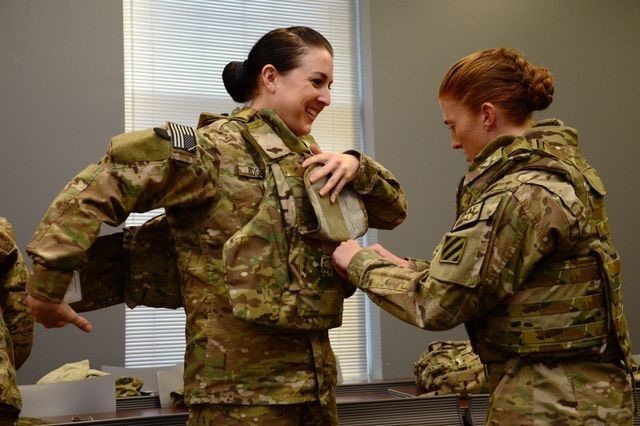
NATICK, Mass. — Researchers at the U.S. Army Combat Capabilities Development Command Soldier Center, or DEVCOM SC, have developed a body armor questionnaire to help improve body armor for female users specifically and for all body armor users in general.
The researchers at DEVCOM SC — who are longtime experts in Soldier protection, human factors and gathering/analyzing Soldier input — are investigating body armor fit and related issues, and how those issues impact the ability of users to perform their mission.
Participation from current and past users of body armor will provide researchers with insight into user needs and ways to make improvements. Data will be collected from a questionnaire completed by eligible individuals.
The questionnaire is part of DEVCOM SC’s larger effort to support the Female Body Armor Modernization Act. In support of the act, DEVCOM SC is investigating and developing body armor system improvements specifically focused on women as well as improvements that will benefit both male and female Soldiers. DEVCOM SC’s Applied Ergonomics Team and the Consumer Research Team, both part of DEVCOM SC’s Soldier Effectiveness Directorate, have worked together to develop the questionnaire.
Blake Mitchell, team leader of the Applied Ergonomics Team and lead for the Anthropometric Study for the Female Body Armor Modernization program, explained that the questionnaire will help “to identify the predominant fit and performance issues, as well as the body armor system sizing and issuance process experienced by women in the Army.”
Mitchell explained that the questionnaire goes into considerable depth in its attempt to identify what the primary issues are in a way that can allow for design improvements. The questionnaire gives participants the means to identify ways they are not fully protected, any discomfort they experience — both short or long term — and how issues with fit may impede their ability to do their job.
“We want potential participants to understand the importance of completing this survey, because it takes time to answer all questions honestly and thoroughly, particularly for those who have more experience with body armor,” said Wendy Johnson, a research psychologist on the Consumer Research Team. “In order to make the survey more convenient and to accommodate their schedules, participants have up to seven days to complete the survey once they begin.”
The questionnaire is aimed at women in the Army, but all genders are welcome to respond. The research team hopes to use data from male respondents to better understand their general fit and performance issues. Researchers are also interested in gathering opinions of body armor users from the National Guard and the Reserves, as well as individuals who have recently separated from the military.
“We hope to elicit responses from a wide variety of mission areas across the military – from people that only have to wear body armor occasionally to those that wear it day and night for extended periods of time,” said Mitchell. “Having data from a broad array of users will allow us more power in how we understand and interpret the data, and aid in the better design of future systems to accommodate a broader range of the user population.”
The questionnaire asks respondents relevant questions about their body shape and size, as well as their experiences with, and performance impacts due to, body armor use. In addition to identifying the specific body armor elements that need to be improved, researchers also hope to find out what is working well.
“Researchers will summarize the information derived from this questionnaire and will make it available to designers, manufacturers and acquisition personnel,” said Mitchell. “Key issues will be grouped based on demographic and anthropometric descriptors to lead to a better understanding of how to improve fit and performance.”
As part of their larger effort to improve female body armor, DEVCOM SC researchers are also using data from the 2012 Anthropometric Survey, or ANSUR II, to better understand the size and shape of women who make up the U.S. Army. ANSUR II includes direct measurements and three-dimensional whole-body scans. ANSUR II was executed by DEVCOM SC and is one of the world’s largest and most comprehensive anthropometric surveys. It provides invaluable data that aids the design and optimization of a wide range of products.
The body armor questionnaire is part of DEVCOM SC’s ongoing emphasis on Soldier input as a key component in all research and product development.
“The Soldier Center wants to ensure that all of the products we support meet the requirements of all Soldiers so they can complete their mission and do their job without creating unneeded or additional burdens for them,” said Mitchell. “This questionnaire will provide specific information on Soldier’s preferences and experiences for body armor in their own voice.”
Data gathered from DEVCOM SC’s questionnaire will be used to improve future body armor development efforts for the Army. Navy body armor designers and project officers have also expressed interest in the results and have requested information and summary data on female Sailors who have experience with certain Navy body armor systems, as responses from other services are also being collected. The Soldier Center plans to have a summary of results by the end of the fiscal year.
If you are interested in participating in the questionnaire, it is available at online.
By Jane Benson, DEVCOM SC Public Affairs


Good to see intent to make wearing armor more comfy for ladies, but holy crap the questionnaire is long. I was trying to see if they were looking into changing the shape of the plates or general carrier sizing, but after about the 8th question on bras it was obvious it was going to be a long ride. I suppose it shows they are really getting in there to pay attention to even the small details though.